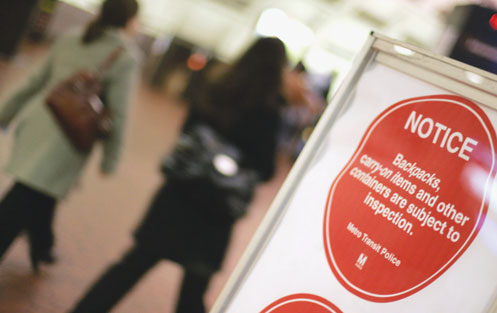
By Taryn Luntz
Examiner Staff Writer 10/28/08
http://www.dcexaminer.com/local/Metro_officers_to_randomly_search_passengers_bags.html

A transit police sign displayed in the Gallery Place station alerts riders Metro will begin implementing random bag searches.Andrew Harnik/ExaminerMetro police officers will begin randomly searching riders’ bags and packages at rail stations and in Metrobuses in an effort to deter potential terrorist attacks, the transit agency said Monday.
The new security measure, which has been under consideration at Metro for the last several years, is not the result of any direct threat, but rather a response to ongoing security concerns and the upcoming presidential election and inauguration, General Manager John Catoe said.
Metro has trained about 15 of its 410 active transit police officers to conduct the searches. The officers will work in conjunction with bomb-sniffing dogs, Transit Police Chief Michael Taborn said.
Groups of five to eight officers will work together at a station entrance, about 20 feet before the fare gates, to select riders and visually inspect their bags.
Police will select a number, such as 14, and then pull every 14th passenger for an inspection, Taborn said. Riders displaying suspicious behavior also may be subject to having their bags searched, he said.
Taborn estimated passengers will complete the search process within eight to 15 seconds.
The searches may begin at any time and will not be announced in advance.
Similar measures have been in place in New York’s subway system since 2005 and on Boston’s rail system since 2006, prompted by the 2004 and 2005 commuter train and subway bombings in Madrid and London.
Amtrak in February authorized random searches of its customers.
In addition to acting as a deterrent to attacks, the inspections will “disrupt the ability of terrorists to discern a pattern in [Metro’s] security measures,” Taborn said.
The inspections are targeted toward finding hazardous materials or explosives, but police will seize illegal substances such as drugs and cite the offender, Taborn said.
Anyone who does not wish to comply with the search will not be allowed to board a train or bus but will be free to leave the station, officials said.
Lawyers from the American Civil Liberties Union, which challenged New York’s bag-check measure in federal court, said the searches constitute a violation of the Fourth Amendment guarantee against unreasonable search and seizure because those searched are not suspected of committing a crime.
“In order to persuade the court that these measures are constitutional, the government would have to show that these searches would be effective,” said Stephen Block, legislative counsel for the ACLU of the National Capital Area.
“With such a few numbers of officers detailed to do this at Metro, it’s just on the face of it not going to be effective,” he said. “If they’re searching people at Farragut West, the would-be terrorist can just get on the up escalator and walk a block and a half to Farragut North.”
Metro has 1,500 buses and 86 rail stations with a total of 117 entrances.
Block said the random searches also distract officers from targeting other types of crime, such as robberies, which are rising in the system.
A federal appeals court in 2006 upheld the constitutionality of random bag searches in New York’s subway system, concluding that it was “unsurprising and undisputed that terrorists view it as a prime target” and that the program was “reasonably effective.”
New York police at least twice have thwarted attacks on the city’s subway system, once in 1997 in Brooklyn and again in a 2004 bomb plot at the Herald Square subway station.
Robert Puentes, a fellow at the Brookings Institution Metropolitan Policy Program, said random search programs are often designed to increase the comfort level of people who use major transit systems, where it is not practical to implement rigid, airport-style security measures.
“I’m sure that part of the benefit of this is at least providing some level of comfort to riders that there is some surveillance,” Puentes said. “Some of the existing surveillance is hard to notice. This is a very visible way to do that.”
Metro has an extensive network of surveillance cameras in the
rail system and has cameras on nearly half of its bus fleet. The transit agency
also is continuing to install explosive-containment trash cans in stations,
and has conducted specialized training to teach officers to spot suspicious
behaviors and to confront potential terrorists.
Find this article at:
http://www.dcexaminer.com/local/Metro_officers_to_randomly_search_passengers_bags.html